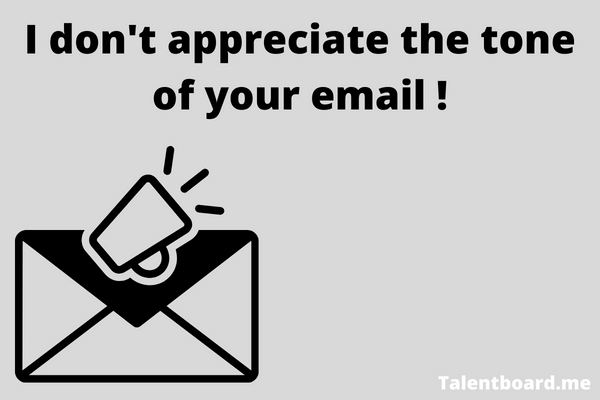Situation: A decision-making debate is taking place in the office. The other person, typically a boss, responds to your fact-based argument with “I don’t like your tone” or “i don’t appreciate the way you talk to me”
This causes you to defend your tone or attitude instead of defending a weak viewpoint, which transfers the conversation’s focus from the facts being discussed to the tone or attitude.
It is a widespread and typical issue. How can “I don’t like your tone” not cause a conversation with a manager to fall apart?
Of course, the desired result would be for your argument to be treated as intended, with data and facts taken into account about the reasonable conclusion you are supporting.
It’s possible that some people “don’t like your tone” just because you challenge or argue with them in any way.
In this situation, you should seriously reconsider quitting it and refraining from challenging or disagreeing with them to the greatest extent possible.
You should always maintain a neutral to pleasant tone or language because meta-debate about tone or attitude diverts attention from the crucial facts, views, and conjectures that are a part of every business discussion.
How to handle the situation? : I don’t appreciate the way you talk to me

If you goof up on this to the point where a colleague has to say, “I don’t like your tone,” you should correct this by stating,
“”I’m sorry.” I didn’t aim to incite your feelings or cause you any distress. Thank you for notifying me that I have crossed the line.”
After that, breathe deeply and be at ease. Now, calmly present your argument and your facts. If it happens frequently, you can apologize briefly before repeating it.
“Any idiot can see, for instance, that using two-factor authorization is the only safe option!”
I don’t like your tone.
“I’m sorry. [Pause.] Using two factors will make authorization much safer. Given what we are defending, I believe it to be the best course of action.”
You don’t have to change your perspective or any of its supporting facts, but you can say them in a way that doesn’t upset anyone. This will increase the likelihood that others will concur with it.
Thus as time passes, you should genuinely appreciate those guiding you toward a more neutral-to-friendly way of communicating.
I don’t Appreciate The Tone of Your Email
In the office, email reigns supreme. It helps to communicate without face-to-face conversation and is quick and effective.
However, face-to-face interactions sometimes have advantages that don’t necessarily translate to online correspondence.
The use of nonverbal clues is crucial. The words typed in an email are subject to horrible misinterpretations by the boss or employer because email lack the added meaning that non-verbal clues contribute to a discussion.
Face expressions, stance, motions, and voice tonality are all examples of body language contributing to the assessment and context of the message being communicated.
For instance, it can be exceedingly challenging to recognize sarcasm in writing.
Here are some suggestions for how to understand emails correctly and how not to have your emails misinterpreted.

- Capital Letters Can Appear Rude
When two persons are in two different environments, it can be simple to interpret the use of Caps Lock wrong.
Not only are you and your receiver not in the same context or environment while conversing over email, but you are also not in the same physical environment.
The words displayed on the screen are the only material you see and provide you with context.
- Do Not Use Negative Language in the Subject
Negative language and a negative tone are frequently directly associated. Sending emails with derogatory subject lines decreases the likelihood of being opened and read.
If your subject lines use harsh language, try to reword them.
For Example:
“Adjustments to be made in the most recent report” could be stated in the subject line rather than “Recent report wasn’t really great enough.”
- Never Use Negative Language
Everyone has their way of Interpretation through which they draw conclusions and build ideas about what is taking place in the present.
The reader may infer the sender is angry, impatient, or unfriendly if a sender uses negative language in an email. Always consider how your reader will understand your content, and you’ll be able to keep business connections from becoming tense.
How Do You Say “I don’t Appreciate Your Tone” Professionally?
Everybody occasionally takes offense. Whenever anyone says anything impolite or inappropriate, we frequently become upset. Even though the offender may not have intended to upset you, the matter still needs to be addressed.
Don’t worry if you’re worried about the issue getting worse. There are several non-confrontational ways to convey your feelings.
- Request a Repeat From the Speaker
This might be a perfect approach to start the conversation. Because they believe no one will object, many offensive remarks go unchallenged.
Asking them to repeat themselves forces them to acknowledge what they said and determines whether they stand by it.
- Clarify Your Linguistic Use
Ask the person to clarify their usage of inappropriate language if it was used in a specific way. When challenged, most people won’t be eager to explain their use of harsh words.
- Explain How You Feel About What They Said
It’s possible that they didn’t say anything that offended you. It could have been their timing or tone. Describe your Interpretation of their statement. They might be shocked by what you say.
How to Counter “I don’t Appreciate Your Tone” In a Work Conversation
By avoiding the troublesome tone, you can actually “fight” someone’s criticism of your style by trying to prevent them from doing so in the first place.
However, a good deal of it (particularly the “rephrase” aspect) would also assist with preventing a tone that might offend people after they have critiqued your tone.
- First, Apologize
You might not find this to be the advice you’re seeking, and you might not think you’ve done anything wrong (and this may be true). However, defusing the situation would still be the most effective method.
- Keep Delaying or Shifting the Conversation
If you truly need to and cannot reword what you’ve already stated in a “better” way, this is generally the best method to continue the conversation.
You might say something like this:
“Can we talk about this more tomorrow? I need to give it some thought and organize my thoughts first “.
You might switch the conversation to email, as another answer advises. Or, you might invite some additional participants to the discussion. If you are unsure of the cause of the issue with your tone, choosing this choice will likely be the most challenging.
Giving specific advice is equally problematic; responding to this question in a particular situation would be much simpler.